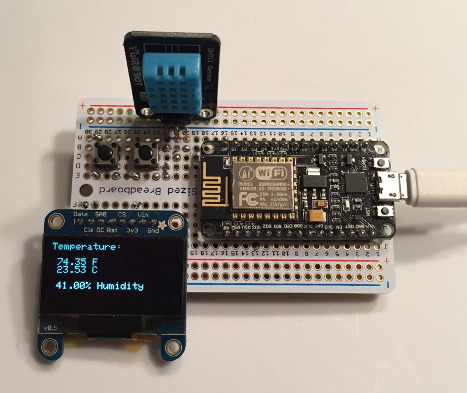This Arduino program creates a web server that displays the temperature. It uses a Nodemcu ESP8266, DHT temperature sensor, Adafruit 128x64 OLED, and 2 buttons. Information is also displayed on the OLED.
Back
Temperature Web Server with OLED
Posted: 10-15-2017

Language: Arduino
// Temperature Web Server with OLED
// Author: Trigat
// ---------------------------------
// Uses NodeMCU ESP8266, DHT sensor, Adafruit OLED, and buttons
// Based on code from Adafruit
// Connect button 1 to GPIO16 on the NodeMcu
// Connect button 2 to GIPO10
// Use a 10k resistor for both buttons when connecting them to 3.3V
// Connect DHT sensor's DATA to GPIO2
// Connect RST on OLED to RST on the NodeMcu
// OLED CLK connects to GPIO5 of NodeMcu
// OLED DATA connect to GPIO4 of NodeMcu
#include <ESP8266WiFi.h>
#include <DHT.h> // temperature sensor
#include <Wire.h> // used for I2C communication
#include <SPI.h>
#include <Adafruit_SSD1306.h>
#define OLED_RESET LED_BUILTIN
Adafruit_SSD1306 display(OLED_RESET);
#define DHTTYPE DHT11 // use for DHT 11
//#define DHTTYPE DHT21 // use for DHT 21
//#define DHTTYPE DHT22 // use for DHT 22
int pushButton1 = 16;
int pushButton2 = 10;
int buttonState1 = 0;
int buttonState2 = 0;
const char* ssid = "SSID_NAME";
const char* password = "SSID_PASSWORD";
WiFiServer server(80);
const int DHTPin = 2;
// Initialize DHT sensor.
DHT dht(DHTPin, DHTTYPE);
// Temporary variables
static char celsiusTemp[7];
static char fahrenheitTemp[7];
static char humidityTemp[7];
void setup() {
pinMode(pushButton1, INPUT);
pinMode(pushButton2, INPUT);
// initialize serial port
Serial.begin(115200);
delay(10);
display.begin(SSD1306_SWITCHCAPVCC, 0x3D); // initialize with the I2C addr 0x3D (for the 128x64)
// Show image buffer on the display hardware.
// displays splashscreen
display.display();
delay(1000);
display.clearDisplay();
display.println(" ");
// Clear the buffer.
display.display();
display.clearDisplay();
dht.begin();
// connect to SSID
Serial.println();
Serial.print("Connecting to ");
Serial.println(ssid);
WiFi.begin(ssid, password);
while (WiFi.status() != WL_CONNECTED) {
delay(500);
Serial.print(".");
}
Serial.println("");
Serial.println("WiFi connected");
// Starting the web server
server.begin();
Serial.println("Web server up. Obtaining IP for the server...");
delay(10000);
// Printing the ESP IP address
Serial.println(WiFi.localIP());
}
void loop() {
WiFiClient client = server.available();
if (client) {
// boolean to locate when the http request ends
boolean blank_line = true;
while (client.connected()) {
if (client.available()) {
char c = client.read();
if (c == '\n' && blank_line) {
float h = dht.readHumidity();
// Read temperature as Celsius (the default)
float t = dht.readTemperature();
// Read temperature as Fahrenheit (isFahrenheit = true)
float f = dht.readTemperature(true);
// Check if any reads failed and exit early (to try again).
if (isnan(h) || isnan(t) || isnan(f)) {
Serial.println("Failed to read from DHT sensor!");
strcpy(celsiusTemp,"Failed");
strcpy(fahrenheitTemp, "Failed");
strcpy(humidityTemp, "Failed");
}
else {
// Computes temperature values in Celsius + Fahrenheit and Humidity
float hic = dht.computeHeatIndex(t, h, false);
dtostrf(hic, 6, 2, celsiusTemp);
float hif = dht.computeHeatIndex(f, h);
dtostrf(hif, 6, 2, fahrenheitTemp);
dtostrf(h, 6, 2, humidityTemp);
}
// Create web page
client.println("HTTP/1.1 200 OK");
client.println("Content-Type: text/html");
client.println("Connection: close");
client.println();
client.println("<!DOCTYPE HTML>");
client.println("<html>");
client.println("<head></head><body bgcolor=\"#092706\"><font color=\"#46993D\"><h3>Temperature in Celsius: ");
client.println(celsiusTemp);
client.println("*C</h3><h3>Temperature in Fahrenheit: ");
client.println(fahrenheitTemp);
client.println("*F</h3><h3>Humidity: ");
client.println(humidityTemp);
client.println("%</h3>");
client.println("</font></body></html>");
break;
}
if (c == '\n') {
// when new line is read
blank_line = true;
}
else if (c != '\r') {
// when new character found on line
blank_line = false;
}
}
}
// closing the client connection
delay(1);
client.stop();
}
buttonpress();
}
void buttonpress() {
// read the state of the pushbutton value:
buttonState1 = digitalRead(pushButton1);
buttonState2 = digitalRead(pushButton2);
// check if the pushbutton is pressed.
if (buttonState1 == LOW) {
Serial.println("Button 1 Pushed");
// draw rectangles
testdrawrect();
display.display();
delay(1000);
display.clearDisplay();
// text display tests
display.setTextSize(1);
display.setTextColor(WHITE);
display.setCursor(0,0);
display.println("Connect to:");
display.println(" ");
display.print("http://");display.println(WiFi.localIP());
display.println(" ");
display.println("WIFI name:");
display.println(ssid);
display.display();
display.clearDisplay();
delay(6000);
display.println(" ");
display.display();
display.clearDisplay();
delay(20);
}
if (buttonState2 == LOW) {
Serial.println("Button 2 Pushed");
float h = dht.readHumidity();
// Read temperature as Celsius (the default)
float t = dht.readTemperature();
// Read temperature as Fahrenheit (isFahrenheit = true)
float f = dht.readTemperature(true);
float hic = dht.computeHeatIndex(t, h, false);
dtostrf(hic, 6, 2, celsiusTemp);
float hif = dht.computeHeatIndex(f, h);
dtostrf(hif, 6, 2, fahrenheitTemp);
dtostrf(h, 6, 2, humidityTemp);
// display temperature on OLED
display.setTextSize(1);
display.setTextColor(WHITE);
display.setCursor(0,0);
display.println("Temperature:");
display.println(" ");
display.print(fahrenheitTemp);
display.println(" F");
display.print(celsiusTemp);
display.println(" C");
display.println(" ");
display.print(humidityTemp);
display.println("% Humidity");
display.display();
display.clearDisplay();
delay(5000);
display.println(" ");
display.display();
display.clearDisplay();
delay(20);
}
}
void testdrawrect(void) {
for (int16_t i=0; i<display.height()/2; i+=2) {
display.drawRect(i, i, display.width()-2*i, display.height()-2*i, WHITE);
display.display();
delay(1);
}
}